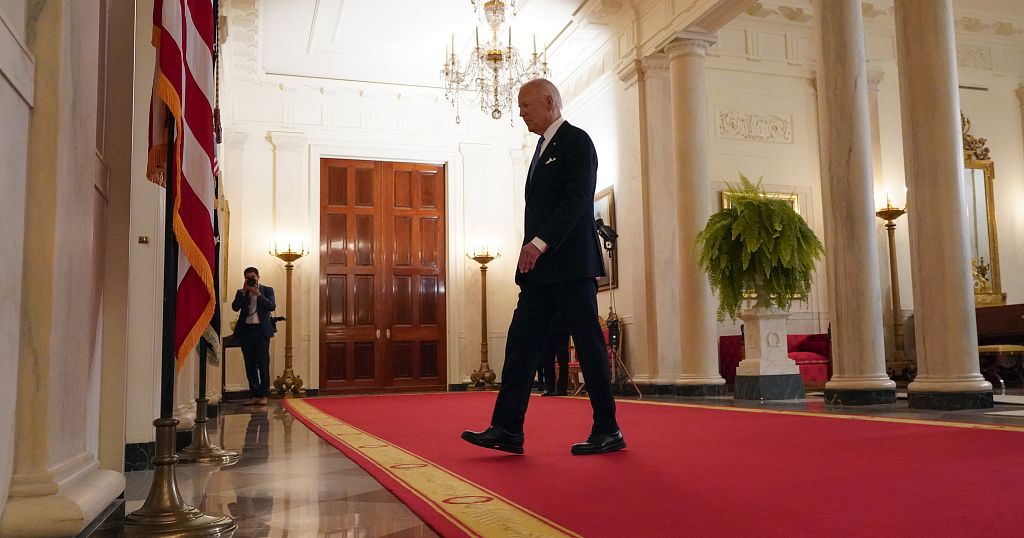

U.S. president Joe Biden stays the course.
The octogenerian is “absolutely not” pulling out of the presidential race, his spokeswoman said Wednesday.
Last August, the Associated Press-NORC poll found that three-quarters of U.S. adults said that Biden was too old to effectively serve another four-year term as president. The concern is only growing.
“I panicked. I lie in my bed at night and I’m afraid. I don’t think Joe Biden is the best person to run in this election. I don’t know who would be the best. But I don’t trust Joe Biden can win this election and that scares me a lot,” a US voter says.
Biden met for more than hour at the White House on Wednesday night, in person and virtually, with more than 20 Democratic governors who afterward described the conversation as “candid” but said they were standing behind Biden despite being concerned about a Trump victory in November.
“The president is our nominee. The president is our party leader,” said Gov. Wes Moore of Maryland. He added that, in the meeting, Biden “was very clear that he’s in this to win.”
Despite such reassuring sentiments, a major Democratic donor, Netflix co-founder Reed Hastings, also called on the president to exit the race, saying, “Biden needs to step aside to allow a vigorous Democratic leader to beat Trump and keep us safe and prosperous.” The statement was first reported by The New York Times.
And all that followed Rep. Jim Clyburn, a longtime Biden friend and confidant, saying he’d back a “mini-primary” in the run-up to the Democratic National Convention next month if Biden were to leave the race. The South Carolina Democrat floated an idea that appeared to be laying the groundwork for alternative choices by delegates during the Democrats’ planned virtual roll call that is scheduled before the more formal party convention set to begin Aug. 19 in Chicago.
On CNN, Clyburn said Vice President Kamala Harris, governors and others could join the competition: “It would be fair to everybody.”
Clyburn, a senior lawmaker who is a former member of his party’s House leadership team, said he has not personally seen the president act as he did on the debate stage last week and called it “concerning.”
And even as other Democratic allies have remained quiet since Thursday’s debate, there is a growing private frustration about the Biden campaign’s response to his disastrous debate performance at a crucial moment in the campaign — particularly in Biden waiting several days to do direct damage control with senior members of his own party.
Not many uncontrolled public appearances
Biden’s lack of public visibility in situations that aren’t tightly controlled has been evident throughout his presidency.
The 36 news conferences he had given through June 30 were fewer than any president in the same time frame since Ronald Reagan, according to Martha Joynt Kumar, director of the White House Transition Project. Biden gave a total of 128 interviews, compared to Donald Trump’s 369 at the same stage of his presidency and 497 by Biden’s former boss, she said.
It was noticed in February when Biden passed up an interview in the Super Bowl pregame show, a relatively new presidential tradition that offers an audience of tens of millions of people.
Under pressure following the debate, Biden has agreed to an interview on Friday with George Stephanopoulos of ABC News, and his team said he would do a news conference next week.
“It is simply astounding for the entire country, including its most seasoned reporters, to be as shocked as everyone was by the ugly and painful reality of Biden’s debate performance,” Jill Abramson, former executive editor of The New York Times, told the website Semafor this week.
While it was a “super hard story to report,” she said it could have been done. Instead, Abramson said, the American press failed in its duty to hold those in power accountable.
Certainly, there’s no shortage of “I told you so” sentiment coming from Biden opponents. “Conservatives have noticed that for a very long time,” said “Fox & Friends” host Ainsley Earhardt.
It’s a complicated story that has bubbled for months — and, it can be argued, the American people were onto it first.







:max_bytes(150000):strip_icc()/GettyImages-1487500031-ce7ed5ab5b584471a96a2fbf318b5f93.jpg)